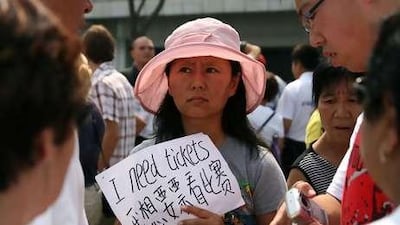BEIJING // Ticket touts on Beijing's sweltering streets are making a killing out of proud Chinese willing to pay hugely inflated prices just to see an event in the city's iconic new Olympic stadium.
Among the crowds milling around by the spectator entrance to the Olympic Green, Han Jing, a 24-year-old fashion designer from Beijing, was hunting for swimming tickets - she and her boyfriend, Xiao Tong, were looking to pay 3,000 yuan (Dh1,610) each for tickets with a retail price of 200 yuan (Dh110). She pointed at the bulbous blue membranes of the Water Cube swimming venue just a couple of hundred metres away beyond ticket control.
"I want to go to the Water Cube because I've never been there before. This is China's first ever Olympics, and I want to have this experience. I'm willing to pay 3,000 yuan to see the swimming, and this would be for the cheapest tickets - I'm sure there are tickets that are much more expensive with better views," Han Jing said. Having been bombarded with images of the Water Cube and the Bird's Nest athletics stadium in non-stop coverage of their country's Olympic preparations, the Chinese want to see them for real now the Games have finally arrived - and that means record-breaking business for men such as Joe, a 40-year-old Italian from Genoa in blue-mirrored shades with a fistful of tickets in his hand.
"This is the best yet. The big surprise for me is that the Chinese people are buying for big prices. For Chinese, the Olympics is something very special. It's like Chinese New Year. They feel they have to attend so they spend any money they have to watch what they want to watch. If they don't find the events they want, any tickets are good as long as they are for this area - the Bird's Nest and the Water Cube," he said.
"You come here in the morning, and it's like selling fresh bread. The Chinese will pay thousands of yuan for diving, swimming and gymnastics - these are the most requested sports. Foreigners don't want to pay 20 times face value for a ticket. They say I am crazy." Joe said he made ?5,000 (Dh27,510) on his first day of selling and was on course to make about ?50,000 (Dh 275,100) over two weeks. Touting is illegal in China - but Joe and many others from all over the world as well as from China were selling openly as police walked past. One team of British touts had even employed a local Chinese girl to help with the haggling.
"In the first days everyone was sceptical, there were rumours that if you were caught selling you would go to jail for two weeks. After a few days they found that the scene was wide open and now more and more guys are coming into the street and selling openly. It has become a national sport," Joe said. Despite huge interest from the Chinese in tickets, with long queues in front of branches of the Bank of China when tickets went on sale in tranches and so much demand on the internet that the ticket selling system crashed repeatedly, large swathes of empty seats have been seen at some of the venues.
This is because only a small proportion of the total number of tickets are sold to the public, Joe said, with many more being given to companies sponsoring the Games and athletic federations, from where they inevitably find their way into the hands of touts, fuelling the thriving black market. "It's a question of distribution. Most of the tickets are handed to sponsors and big federations. I've been around since 1984 so I know everyone, and that's how I get the tickets," he said.
An American tout named Hamil from New York said he expected more tickets to be released as the 80 heads of state and their retinues who attended the opening ceremony and the first few events go home. "When all the fat cats who got all the great tickets and all the heads of state like George Bush go home in the next couple of days, all their tickets will flood the market, and it is going to be good business," he said.
Wang Wei, the vice-president of the Beijing organising committee, said the organisers were aware of complaints from sports fans over the ticketing situation and the empty seats. "The empty seats are a challenge for us, and we are trying to manage that," he told reporters. Meanwhile, Joe said his only problem was likely to be getting the huge pile of money he was making out of the country after the Games are over.
"Since I am being paid in local currency I may have a problem at the end to exchange it. I will have a huge pile of Chinese yuan, and I will have to get it out of the country somehow," he said. "I likes selling on the street - you talk to a lot of people, and it's a great experience. My goal is to be able to tell people that I have made money out of the Chinese. You know the Chinese - they are the best at bargaining. Well, this time I have got the deal out of them."
@Email:tspender@thenational.ae

